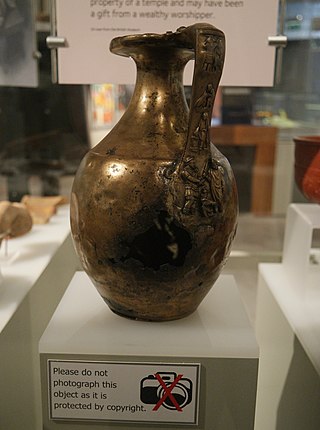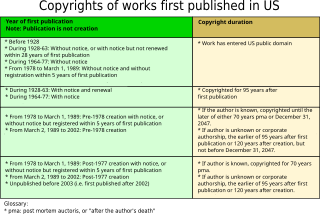A copyright is a type of intellectual property that gives its owner the exclusive right to copy, distribute, adapt, display, and perform a creative work, usually for a limited time. The creative work may be in a literary, artistic, educational, or musical form. Copyright is intended to protect the original expression of an idea in the form of a creative work, but not the idea itself. A copyright is subject to limitations based on public interest considerations, such as the fair use doctrine in the United States.

The United States Copyright Office (USCO), a part of the Library of Congress, is a United States government body that maintains records of copyright registration, including a copyright catalog. It is used by copyright title researchers who are attempting to clear a chain of title for copyrighted works.
A work of the United States government, is defined by the United States copyright law, as "a work prepared by an officer or employee of the United States Government as part of that person's official duties." Under section 105 of US copyright law, such works are not entitled to domestic copyright protection under U.S. law and are therefore in the public domain.
Legal deposit is a legal requirement that a person or group submit copies of their publications to a repository, usually a library. The number of copies required varies from country to country. Typically, the national library is the primary repository of these copies. In some countries there is also a legal deposit requirement placed on the government, and it is required to send copies of documents to publicly accessible libraries.

Carl Malamud is an American technologist, author, and public domain advocate, known for his foundation Public.Resource.Org. He founded the Internet Multicasting Service. During his time with this group, he was responsible for developing the first Internet radio station, for putting the U.S. Securities and Exchange Commission's EDGAR database on-line, and for creating the Internet 1996 World Exposition.
Copyright expiry in Australia depends on when a work was created, and on the type of work. Under the current law, copyright usually expires 70 years after the death of the author, or for anonymous works, 70 years from the date of publication. Crown copyright expires 50 years after publication. The law has evolved over the years, and previously photographs were treated differently from other works. Anonymous works and photographs created before 1955 are no longer under copyright. For non-photographic works created before 1955, where the author is known, the copyright expires 50 years after the death of the author.
PACER is an electronic public access service for United States federal court documents. It allows users to obtain case and docket information from the United States district courts, United States courts of appeals, and United States bankruptcy courts. The system is managed by the Administrative Office of the United States Courts in accordance with the policies of the Judicial Conference, headed by the Chief Justice of the United States. As of 2013, it holds more than 500 million documents.

A copyfraud is a false copyright claim by an individual or institution with respect to content that is in the public domain. Such claims are unlawful, at least under US and Australian copyright law, because material that is not copyrighted is free for all to use, modify and reproduce. Copyfraud also includes overreaching claims by publishers, museums and others, as where a legitimate copyright owner knowingly, or with constructive knowledge, claims rights beyond what the law allows.
Films, like other works of art, are subject to copyright protection. Due to the relatively shorter history of film compared to other artistic mediums the gross amount of films in the public domain is smaller. However, many films have become public domain because the copyright has expired, or they have been intentionally released by their creators. Because copyright term varies by country, certain films might be public domain in one country but not another. For example, the film Metropolis entered the United States public domain in 2023, but under current EU copyright law, the film will remain under copyright in Germany and the rest of the European Union until the end of 2046, 70 years after Fritz Lang's death.

Free content, libre content, libre information, or free information, is any kind of functional work, work of art, or other creative content that meets the definition of a free cultural work.
Crown copyright is a type of copyright protection. It subsists in works of the governments of some Commonwealth realms and provides special copyright rules for the Crown, i.e. government departments and (generally) state entities. Each Commonwealth realm has its own Crown copyright regulations. There are therefore no common regulations that apply to all or a number of those countries. There are some considerations being made in Canada, UK, Australia and New Zealand regarding the "reuse of Crown-copyrighted material, through new licences".
The copyright law of Australia defines the legally enforceable rights of creators of creative and artistic works under Australian law. The scope of copyright in Australia is defined in the Copyright Act 1968, which applies the national law throughout Australia. Designs may be covered by the Copyright Act as well as by the Design Act. Since 2007, performers have moral rights in recordings of their work.

The public domain (PD) consists of all the creative work to which no exclusive intellectual property rights apply. Those rights may have expired, been forfeited, expressly waived, or may be inapplicable. Because no one holds the exclusive rights, anyone can legally use or reference those works without permission.
The copyright law of the United States grants monopoly protection for "original works of authorship". With the stated purpose to promote art and culture, copyright law assigns a set of exclusive rights to authors: to make and sell copies of their works, to create derivative works, and to perform or display their works publicly. These exclusive rights are subject to a time limit, and generally expire 70 years after the author's death or 95 years after publication. In the United States, works published before January 1, 1928, are in the public domain.

Public.Resource.Org (PRO) is a 501(c)(3) non-profit corporation dedicated to publishing and sharing public domain materials in the United States and internationally. It was founded by Carl Malamud and is based in Sebastopol, California.

Works are in the public domain if they are not covered by intellectual property rights at all, or if the intellectual property rights to the works have expired.
Edict of government is a technical term associated with the United States Copyright Office's guidelines and practices that comprehensively includes laws, which advises that such submissions will neither be accepted nor processed for copyright registration. It is based on the principle of public policy that citizens must have unrestrained access to the laws that govern them. Similar provisions occur in most, but not all, systems of copyright law; the main exceptions are in those copyright laws which have developed from English law, under which the copyright in laws rests with the Crown or the government.
The copyright status of works produced by the governments of states, territories, and municipalities in the United States varies. Copyright law is federal in the United States. Federal law expressly denies U.S. copyright protection to two types of government works: works of the U.S. federal government itself, and all edicts of any government regardless of level or whether or not foreign. Other than addressing these "edicts of government", U.S. federal law does not address copyrights of U.S. state and local government.

Free Law Project is a United States federal 501(c)(3) Oakland-based nonprofit that provides free access to primary legal materials, develops legal research tools, and supports academic research on legal corpora. Free Law Project has several initiatives that collect and share legal information, including the largest collection of American oral argument audio, daily collection of new legal opinions from 200 United States courts and administrative bodies, the RECAP Project, which collects documents from PACER, and user-generated Supreme Court citation visualizations. Their data helped The Wall Street Journal expose 138 cases of conflict of interest cases regarding violations by USA Federal judges.







